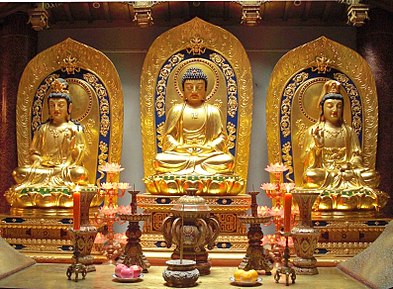I’m in Japan at the moment and just visited a temple in Tokyo that’s part of Pure Land Buddhism, one of the most important and influential sects in the history of Japanese Buddhism. It constitutes a broad branch of Mahayana Buddhism that exists across Southeast Asia.
The three primary texts of the tradition, known as the "Three Pure Land Sutras", are the Longer Sukhāvatīvyūha Sūtra(Infinite Life Sutra), Amitayurdhyana Sutra(Contemplation Sutra) and the Shorter Sukhāvatīvyūha Sūtra (Amitabha Sutra).
A recent English translation of these sutras can be found here:
http://www.bdk.or.jp/document/dgtl-dl/dBET_ThreePureLandSutras_2003.pdf
Pure Land Buddhism is built on the belief that we will never have a world which is not corrupt, so we must strive for re-birth in another plane, referred to as the "Pure Land".
The Pure Land traditions focus on the Buddha Amitābha. Amitābha is a celestial buddha and the principal buddha in Pure Land Buddhism. In Vajrayana Buddhism, Amitābha is known for his longevity attribute, magnetising red fire element, the aggregate of discernment, pure perception and the deep awareness of emptiness of phenomena. According to these scriptures, Amitābha possesses infinite merit resulting from good deeds over countless past lives as a bodhisattva named Dharmakāra. Amitābha means "Infinite Light", and Amitāyus means "Infinite Life" so Amitābha is also called "The Buddha of Immeasurable Light and Life".
Amitābha - Wikipedia
It seems to me from both my recent study of Pure Land Buddhism and the practices of my Japanese relatives, both Pure Land and Japanese Buddhism generally, differ significantly from how Buddhism is understood and practised in the West.
I’m posting this in the religious debates section to allow the freedom for any questions and comments. I’m keen to learn more about Buddhism. What is your experience of Buddhism and has anything I’ve posted here changed your perspective on what Buddhism is or isn’t?
The three primary texts of the tradition, known as the "Three Pure Land Sutras", are the Longer Sukhāvatīvyūha Sūtra(Infinite Life Sutra), Amitayurdhyana Sutra(Contemplation Sutra) and the Shorter Sukhāvatīvyūha Sūtra (Amitabha Sutra).
A recent English translation of these sutras can be found here:
http://www.bdk.or.jp/document/dgtl-dl/dBET_ThreePureLandSutras_2003.pdf
Pure Land Buddhism is built on the belief that we will never have a world which is not corrupt, so we must strive for re-birth in another plane, referred to as the "Pure Land".
The Pure Land traditions focus on the Buddha Amitābha. Amitābha is a celestial buddha and the principal buddha in Pure Land Buddhism. In Vajrayana Buddhism, Amitābha is known for his longevity attribute, magnetising red fire element, the aggregate of discernment, pure perception and the deep awareness of emptiness of phenomena. According to these scriptures, Amitābha possesses infinite merit resulting from good deeds over countless past lives as a bodhisattva named Dharmakāra. Amitābha means "Infinite Light", and Amitāyus means "Infinite Life" so Amitābha is also called "The Buddha of Immeasurable Light and Life".
Amitābha - Wikipedia
It seems to me from both my recent study of Pure Land Buddhism and the practices of my Japanese relatives, both Pure Land and Japanese Buddhism generally, differ significantly from how Buddhism is understood and practised in the West.
I’m posting this in the religious debates section to allow the freedom for any questions and comments. I’m keen to learn more about Buddhism. What is your experience of Buddhism and has anything I’ve posted here changed your perspective on what Buddhism is or isn’t?

